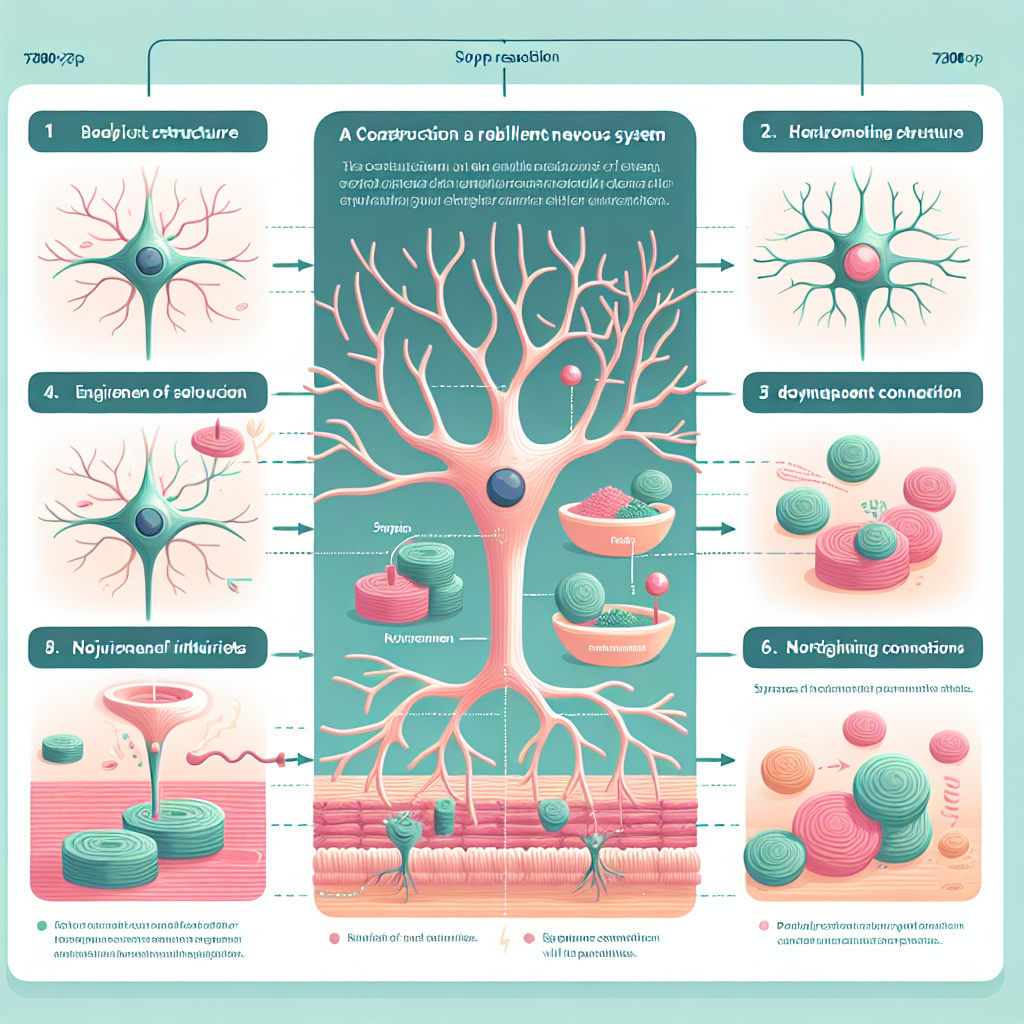How to Build a Resilient Nervous System

Start building a resilient nervous system today! Learn more about the steps and techniques you can implement for a healthier, stronger nervous system. Visit www.myvibrantvitality.com now.
Strategies for Strengthening Your Nervous System: A Comprehensive Guide
The human nervous system, a complex network of nerves and cells, is responsible for transmitting signals between different parts of the body. It is the communication and control center that governs everything from our heartbeat to our ability to read this article. Given its critical role, it is essential to maintain a healthy and resilient nervous system. This article will provide a comprehensive guide on strategies to strengthen your nervous system.
Firstly, a balanced diet plays a crucial role in maintaining a healthy nervous system. Consuming foods rich in B vitamins, such as whole grains, lean meats, and legumes, can help improve nerve function. Omega-3 fatty acids, found in fish and flaxseeds, are also beneficial as they aid in the formation of the myelin sheath, a protective layer that surrounds the nerves. Additionally, antioxidants found in fruits and vegetables can protect the nervous system from damage caused by free radicals.
Secondly, regular physical activity is another key strategy for building a resilient nervous system. Exercise increases blood flow to the brain, promoting the growth and survival of neurons. It also helps in the release of neurotrophic factors, proteins that support neuron function and survival. Regular physical activity can range from brisk walking to more vigorous exercises like running or cycling, depending on your fitness level.
Thirdly, adequate sleep is vital for a healthy nervous system. During sleep, the brain and nervous system undergo a process of repair and regeneration. Lack of sleep can lead to cognitive impairments and a decrease in the ability to cope with stress, which can put a strain on the nervous system. Therefore, ensuring you get enough quality sleep is an essential part of maintaining a resilient nervous system.
Fourthly, stress management is another crucial aspect of building a resilient nervous system. Chronic stress can lead to an overactive nervous system, resulting in various health problems such as anxiety, depression, and heart disease. Techniques such as mindfulness, meditation, and yoga can help manage stress levels and promote a sense of calm and well-being.
Lastly, avoiding harmful substances such as alcohol, nicotine, and illicit drugs is essential for a healthy nervous system. These substances can damage neurons and other cells in the nervous system, impairing its function. Therefore, it is advisable to limit or avoid their consumption.
In conclusion, building a resilient nervous system is a multifaceted process that involves a balanced diet, regular physical activity, adequate sleep, stress management, and avoiding harmful substances. By incorporating these strategies into your daily routine, you can help ensure that your nervous system remains healthy and robust, allowing you to enjoy a higher quality of life. Remember, it’s never too late to start taking care of your nervous system. So, why not start today?
Building a Resilient Nervous System: Techniques and Tips

Building a resilient nervous system is a crucial aspect of maintaining overall health and well-being. The nervous system, which includes the brain, spinal cord, and a vast network of nerves, plays a pivotal role in how we experience life. It controls everything from our basic bodily functions to our emotions and cognitive abilities. Therefore, it is essential to understand how to build a resilient nervous system that can withstand the stresses and strains of daily life.
The first step towards building a resilient nervous system is to maintain a healthy lifestyle. This includes a balanced diet, regular exercise, and adequate sleep. A balanced diet rich in fruits, vegetables, lean proteins, and whole grains provides the necessary nutrients for the nervous system to function optimally. Regular exercise, on the other hand, enhances blood flow to the brain, promoting the growth and survival of neurons. Adequate sleep is also crucial as it allows the brain to rest and rejuvenate, thereby improving cognitive function and emotional well-being.
In addition to a healthy lifestyle, stress management is another key factor in building a resilient nervous system. Chronic stress can have a detrimental effect on the nervous system, leading to a range of health problems such as anxiety, depression, and even neurodegenerative diseases. Therefore, it is important to incorporate stress management techniques into your daily routine. This could include mindfulness meditation, yoga, deep breathing exercises, or any other activity that helps you relax and unwind.
Another effective way to build a resilient nervous system is through cognitive training. This involves engaging in activities that challenge your brain and stimulate neural growth. Examples of cognitive training include puzzles, reading, learning a new language, or playing a musical instrument. These activities not only enhance cognitive function but also improve the brain’s ability to adapt to new situations, a characteristic known as neuroplasticity.
Furthermore, social interaction is also beneficial for the nervous system. Research has shown that positive social interactions can boost brain health and resilience. Engaging in meaningful relationships, participating in community activities, or volunteering can provide a sense of purpose and belonging, which in turn promotes mental well-being.
Lastly, it is important to seek professional help when needed. If you are experiencing persistent stress, anxiety, or other mental health issues, it is crucial to consult a healthcare professional. They can provide appropriate treatment and guidance to help you build a resilient nervous system.
In conclusion, building a resilient nervous system is a multifaceted process that involves maintaining a healthy lifestyle, managing stress, engaging in cognitive training, fostering social connections, and seeking professional help when necessary. By incorporating these strategies into your daily routine, you can enhance your nervous system’s resilience and improve your overall health and well-being. Remember, a resilient nervous system is not built overnight. It requires consistent effort and commitment. But with patience and perseverance, you can cultivate a nervous system that is robust, adaptable, and capable of withstanding the challenges of life.
The Role of Nutrition and Exercise in Developing a Strong Nervous System
The human nervous system, a complex network of nerves and cells, is responsible for transmitting signals between different parts of the body. It is the communication and control center that governs everything from our heartbeat to our ability to read this article. Given its critical role, it is essential to maintain a healthy and resilient nervous system. Two key factors that significantly contribute to the development and maintenance of a robust nervous system are nutrition and exercise.
Nutrition plays a pivotal role in the health of our nervous system. The food we consume can either strengthen or weaken our nervous system. A balanced diet rich in essential nutrients can help build a resilient nervous system. For instance, B vitamins, particularly B1, B6, and B12, are crucial for nerve function and repair. They help in the formation of myelin, a protective layer that covers nerves. A deficiency in these vitamins can lead to nerve damage and various neurological disorders.
Omega-3 fatty acids, found in fatty fish, walnuts, and flaxseeds, are also essential for a healthy nervous system. They help in the formation of nerve cells and improve cognitive function. Antioxidants, such as vitamins C and E, protect the nervous system from damage caused by free radicals. They also aid in the repair of damaged nerve tissue. Therefore, incorporating foods rich in these nutrients into your diet can significantly enhance the health and resilience of your nervous system.
On the other hand, certain foods can harm the nervous system. High intake of processed foods, saturated fats, and sugars can lead to inflammation and oxidative stress, damaging the nervous system. Alcohol and caffeine can also have detrimental effects on the nervous system when consumed in excess. Therefore, it is advisable to limit the intake of these substances to maintain a healthy nervous system.
Transitioning from the role of nutrition, exercise is another crucial factor in building a resilient nervous system. Regular physical activity has numerous benefits for the nervous system. It increases blood flow to the brain, delivering more oxygen and nutrients to the nerve cells. This promotes the growth and survival of neurons, enhancing cognitive function and memory.
Exercise also stimulates the production of neurotrophins, proteins that aid in neuron survival and function. It helps in the formation of new neural connections, improving the plasticity of the brain. This makes the nervous system more adaptable and resilient to stress and injury.
Moreover, exercise has been found to have a protective effect on the nervous system. It reduces the risk of neurodegenerative diseases like Alzheimer’s and Parkinson’s. It also helps in managing stress and anxiety, which can have harmful effects on the nervous system.
In conclusion, nutrition and exercise play a significant role in building a resilient nervous system. A balanced diet rich in essential nutrients and regular physical activity can help maintain a healthy and robust nervous system. However, it is important to remember that these are not the only factors that contribute to the health of the nervous system. Adequate sleep, stress management, and regular medical check-ups are also crucial. Therefore, a holistic approach that includes a balanced diet, regular exercise, and a healthy lifestyle is the key to a resilient nervous system.